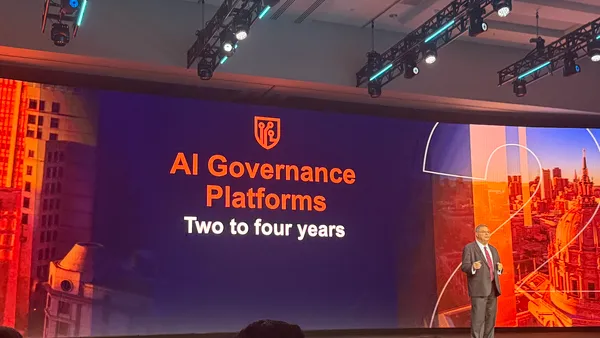Dive Brief:
-
Enterprise spending on tech staff is set to rise 4.6% in 2021 and another 5.4% next year, according to data from Forrester released Monday. The analyst firm takes into consideration the number of workers, salaries and benefits-to-salary ratio in its calculations determining spending on staff.
-
The uptick in tech staff spend is partly driven by demand in data science and AI, said Andrew Bartels, VP and principal analyst at Forrester. But other categories also contributed to the rise in spend, such as the need for cybersecurity talent and "computer information systems managers," which includes CIOs and other tech roles such as enterprise architects.
-
Overall tech spending is projected to rise 6% in 2021. Similarly, Forrester expects companies to grow their outsourcing costs by 6% in 2021 and another 6.8% in 2022.
Dive Insight:
In April 2020, Forrester had forecast spending on CIO staff to decrease, at best, by 1.4% over 2019 numbers. At worst, the firm said spending would shrink by 3.3%. Though the forecast fluctuated throughout 2020 in response to the pandemic, the end result was a forecast 3.6% contraction in CIO staff spending.
While hard-hit industries such as oil and gas or leisure and entertainment laid off IT staff last year, the decrease in headcount was offset by big IT workforce expansions among non-store retailers, couriers and delivery services.
Last year primed the industry to expand its cybersecurity talent needs as operations changed, said Bartels. Companies enabled work from home and created new online commerce channels, which in turn led organizations to "hire security staff to help them manage" the new exposure.
Increased adoption of low-code and no-code tools is skewing demand toward web developers and software engineers, and away from coders and programmers, said Bartels. The trend is affecting headcounts and salaries in these categories.
Overall, the software industry workforce is projected to grow more than 5% in 2021, according to data from CompTIA's Cyberstates 2021 report.
Amid fierce competition over talent in key spaces, hybrid work deployments can help employers attract potential hires with flexibility that's now becoming table stakes. The ability to hire remotely also lets companies do away with the geographic boundaries and tap into more talent pools.
Employers are citing access to talent and skills as the top two hurdles toward growing a digital business, according to data from Gartner. The pressures playing out in the talent space are leading executives to double-down on reskilling and upskilling strategies as well as diversifying their recruiting strategies.




















